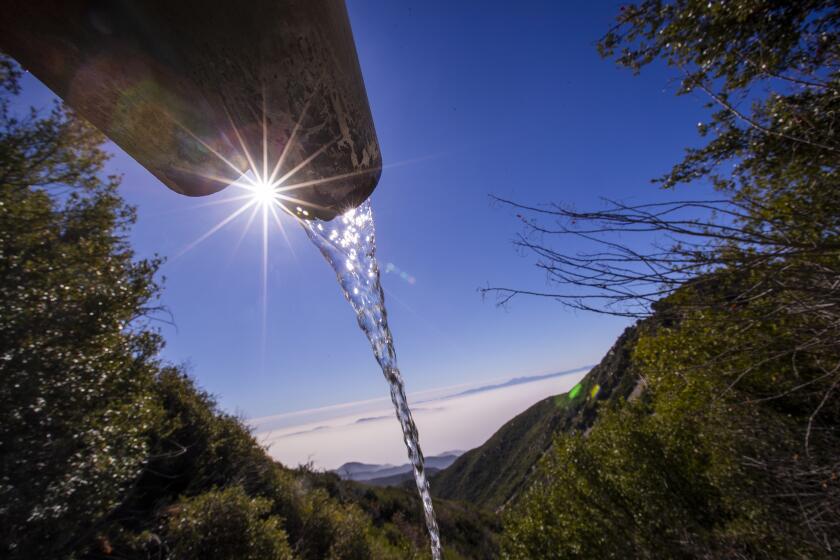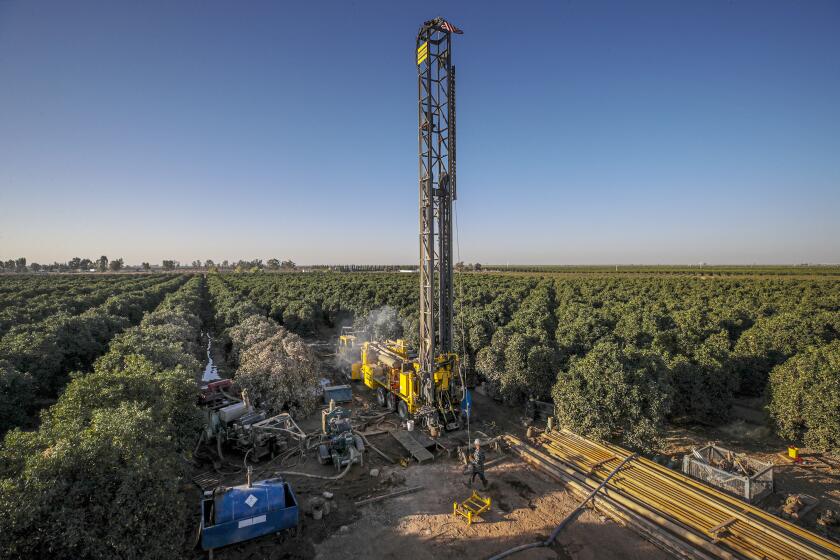Questions about lack of diversity and racial bias roil major California water supplier

Less than a year after battling over the hiring of a new general manager, the board of Californiaâs largest urban water agency remains deeply divided as members challenge each other over questions of diversity and racial bias.
A vote to appoint committee leaders for the Metropolitan Water District of Southern California revealed stark divisions among board members this week, with some calling for more diversity among the appointees and others questioning whether Chairwoman Gloria Gray faced undue opposition over her picks because she is the agencyâs first Black leader.
The disagreement erupted during a vote on Grayâs proposed slate of 12 committee chairs and vice chairs, as well as four vice chairs of the MWD board of directors. The debate, which ended in a stinging defeat for Gray, provided a glimpse into the tensions at an agency that is coping with severe drought while delivering water used by 19 million people across Southern California.
Some of the districtâs 38 board members said they were opposed because they thought the appointees didnât reflect the diversity of Southern California, didnât adequately represent the largest urban areas or wouldnât be the best mix of leaders to tackle issues from water affordability to reducing reliance on imported water.
A company is siphoning water from a national forest to sell as bottled water. California water regulators want to limit the operation.
Criticism also came from former MWD board member Sylvia Ballin, a San Fernando City Council member, who wrote to Gray urging her to withdraw her proposed picks. Ballin wrote in her letter that the committee choices would ârekindle divisionsâ on the board, and that even with the recent creation of new committees focusing on underserved communities and diversity, this group of appointees âdoes not add diversity.â
Ballin and other critics said they were concerned that a large majority of the appointees for committee chairs and vice chairs are white, and 16 of the 24 posts would be held by men.
Ballin said that wouldnât reflect the diversity of MWDâs service area or of California. She warned that naming this group would âcreate more division.â
Gray presented her proposal in back-to-back virtual meetings on Tuesday, first to the MWD executive committee and then to the full board. She defended her proposal, saying she had worked hard on the lineup over the past year, after the board rejected her first slate of appointees. She said she sought input from board members, the districtâs manager and other parties.
âI have been a champion on this board for diversity. I donât think anyone can truthfully say that I have not,â Gray said.
She noted that the board had recently approved her suggestion of creating the new committees on underserved communities and diversity, equity and inclusion. And she defended the proposed numbers of Latino, Black and Asian board members in leadership positions, as well as the number of women.
Despite a California law intended to end over-pumping of aquifers, a frenzy of agricultural well drilling continues in the San Joaquin Valley.
âIt is a diverse slate,â Gray said. She noted that 9 of the 14 women on the board would serve in leadership positions, and would make up nearly half of the executive committee.
âYou cannot say itâs not diverse,â Gray said. âAnd anyone who would question my commitment to diversity is out of line.â
Gray pointed out that as chair, one of her duties is to make committee appointments, subject to the boardâs approval. She said she has been disrespected by some board members, and she has never seen any other chairperson face such challenges.
âI am disturbed by the fact that I am the second woman, the first person of color and specifically, the first African American woman to serve as chair on this board in over 90 years,â Gray said, âbut I am being challenged ⌠by certain board members on issues like this one.â
Gray said she hoped the board would âeliminate the politics and eliminate the personal wants, and come together and serve in a respectable, professional way, rather than challenging a woman of color continuously.â
The Kern River has long been a dry riverbed in downtown Bakersfield. A group of residents is pushing to bring back a flowing river.
Darrell Goode, president of the NAACPâs Santa Monica-Venice branch, expressed concern, telling the board the chairwoman appeared to have been âsubjected to some questionable or challenging racial biases.â
Goode, who is also area director in L.A. County for the civil rights organization, said it had been âbrought to our attention that there may be some biases or prejudice or even racially motivated attitudes towardsâ the chairwoman.
âWe are just going to monitor the district board members and the activity so that all of our community residents are served in an equitable manner, and all people on your board are treated equitably,â Goode said. âWe hope that weâd all move forward in a spirit of cooperation and address white supremacy and racism where it occurs.â
Some who opposed Grayâs picks cited the stances of those selected for leadership roles.
Ellen Mackey, a senior ecologist at MWD and chair of the unionâs womenâs caucus, said she was concerned about handing power in key committees to board members who, during a bitter power struggle last year, opposed the selection of Adel Hagekhalil as general manager.
Hagekhalil has stressed that the water district is moving in a new direction to adapt to climate change by investing in developing local water supplies through wastewater recycling and other projects.
âThese board assignments feel like a continuation of retaliation against anyone who questions the status quo,â Mackey said. âWe are concerned about the leadership equivalent to the old guard, a majority slate of chairs who still ascribe to life as usual at MWD.â
Mackey said she shares the concerns about the lack of diversity. She also reiterated accusations that leaders at MWD have tolerated sexual harassment and abuse of women, particularly in the districtâs trades apprenticeship program. In an investigation last year, The Times found a pattern of complaints alleging harassment and bullying of women who enrolled in the apprentice program.
âNow is an opportunity for board members, and especially new board members, to show real open, transparent leadership,â Mackey said. âWe request a delay in these assignments as critical to the change process that has already begun.â
Caty Wagner of the Sierra Club said the appointees lacked diversity âin both ethnic background and in policy position,â and those tapped to lead key committees have been vocal in supporting plans to build a massive water tunnel through the Sacramento-San Joaquin River Delta, which her group and others have opposed.
âThis is a really obvious attempt to block progressive policy decisions on the board,â Wagner said. All the committees that have major impacts on California water planning, she said, would be âled by white, male board members.â
Wagner also noted that the large metropolitan areas of Los Angeles, San Diego and Long Beach account for nearly 40% of votes on the board but were given fewer leadership slots.
âBy stacking the weight against bigger cities, you are taking away the voices of underserved communities,â Wagner said.
During the debate, several board members voiced support for Grayâs selections.
âIt was a year and month ago that the chairwoman proposed her slate,â said board member Glen Peterson. âThis has been delayed so much.â
Peterson, who was to chair the Imported Water Committee, said there would be more women and more Latino and Black board members leading committees under the proposal, so the purported concern about diversity seemed a ânonissue.â
Peterson added that he didnât vote for Hagekhalil as general manager but said âif Adel succeeds, we all succeed.â
Vice Chair David De Jesus agreed, saying he supports the general manager and backs Gray in her selections.
âThe chairwoman has reached out, has talked to many, and I think itâs time just to support her,â De Jesus said.
Judy Abdo, a board member and secretary, said she was concerned about the âvery divisiveâ discussion. Gray has worked hard to âbring people together,â Abdo said, âand I would like to find a way that we can work together so that everybody can agree.â
She suggested perhaps delaying the matter to work on a unified slate. But others said they preferred to move forward to vote.
Board member Anthony Fellow said heâs never seen anything like the current division on the board. He said Gray has done outstanding work as chair but âevery time she turns her head, sheâs blocked or put through hell.â
Fellow told Gray he didnât know how anybody could vote against her proposal.
âI do have to ask the question: Is it because youâre a woman? Or is it because youâre a woman of color?â Fellow said. âBut Iâve had enough.â
Eleven board members voted no. In the boardâs weighted voting system, which is based on assessed property values in member cities and water agencies, those votes narrowly rejected Grayâs proposal.
Board member AdĂĄn Ortega, who represents San Fernando, said afterward that his opposition is ânot personal.â Itâs about policy, he said, and âasking for more diversity.â
Ortega said he thinks the leadership should, to the greatest degree possible, reflect the diversity of the people it serves â not the current makeup of the board of directors, where a majority of representatives are white. (A precise breakdown of the race and ethnicity of board members isnât currently available because âwe do not collect ethnicity or race information,â said MWD spokesperson Rebecca Kimitch.)
âThe main point of debate is whether Metropolitan should reflect the diversity of Southern California, or the demographics of its own board,â Ortega told The Times. âThatâs the debate. And itâs in terms of not just ethnic, but socioeconomic.â
Ortega said thatâs especially important as the board considers rates and whether to increase fixed charges, a subject that he said might lead to low-income communities paying more for using water delivered by MWD.
On Grayâs list, Ortega would have chaired the Underserved Communities Committee. But Ortega said he and others would still have been outnumbered on the executive committee.
Ortega unsuccessfully challenged Gray as chairperson last year. He was later removed from his seat by Fullerton and subsequently appointed to another seat by San Fernando.
Ortega said he understands why Gray questioned if she was being subjected to racial bias, but he doesnât think that was why her proposal was rejected.
âAs a Latino person, you know, I realize that itâs always in the back of your mind. I donât blame her for that,â Ortega said. âBecause itâs been in the back of my mind plenty of times when Iâve had to face adversity. But in this case, I think we welcome the NAACP. I think the more eyes the better.â
Board member Gail Goldberg, who represents the San Diego County Water Authority, also voted against the appointees.
âI think all of us, including the people who did not vote for the slate, are very supportive of the chair,â Goldberg said.
âThe issue around the slate had really less to do with the chair than it had to do with the fact that we at Met are at a real crossroads,â Goldberg said. She said she and others want the selected leaders to âreflect all of the differences of the board so that we have an opportunity for real discussion and to make good decisions that meet the needs of our entire service area.â
Gray, who represents West Basin Municipal Water District, was first elected chairwoman in 2018 and was reelected in 2020. Her current term ends Dec. 31.
Gray said she thought the result of the vote was âunfortunate and petty and troubling.â
The district has many important issues it needs to focus on, Gray said, including ensuring affordable water, addressing the challenges of shrinking supplies from the Colorado River and the State Water Project, dealing with Californiaâs drought and adapting to climate change.
Without new committee chairs, MWDâs nine existing standing committees will continue to function under their current leaders. The three newly created committees â imported water, underserved communities and diversity, equity and inclusion â canât yet function because they donât have appointed leaders or members.
âThose committees are extremely important for the board to talk about those issues. So thatâs troubling to me,â Gray said in an interview with The Times. âWe will function as best as we can, based on the current structure that we have, and move forward.â










